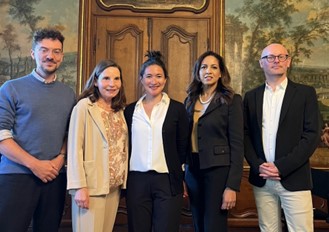It has been almost 25 years since the adoption of the United Nations Convention against Transnational Organised Crime (UNTOC) and its three Protocols including the Protocol to Prevent, Supress and Punish Trafficking in Persons, Especially Women and Children, known as the ‘Palermo Protocol’.[1]
To discuss the evolution and progress in applying these important instruments of international law, scholars and practitioners convened at a conference hosted by the Institute for Comparative Criminal Law at the University of Cologne (6-7 June).
ASEAN-ACT’s International Legal Adviser Dr Marika McAdam presented on the evolution and experiences of the Palermo Protocol. While acknowledging the progress made to date – including the adoption of in the ASEAN Convention against Trafficking in Persons, Especially Women and Children (ACTIP) that transposes several UNTOC provisions – Dr McAdam argued that trafficking in persons has not been responded to with the level of commitment and cooperation envisaged in the convention.
She argued that, by and large, countries have not leveraged the cooperative mechanisms provided for in the UNTOC and have instead pursued low-level actors in the trafficking chain based on evidence available within their own jurisdictions, allowing more powerful criminal actors to evade justice and continue to operate across borders.
Dr McAdam described what she sees as a carving out of the Palermo Protocol from the UNTOC with detrimental consequences for counter-trafficking in practice. She argued that effective implementation of the Palermo Protocol, including preventing and supressing the crime, protecting and assisting its victims, and cooperating to these ends required countries to interpret the Protocol and its parent Convention as inextricably linked.
In referring specifically to the ASEAN context, in which countries of origin have rapidly become countries of destination for trafficking victims from within the region and elsewhere, into criminality and others forms of exploitation in purpose-built scamming compounds, Dr McAdam underscored the urgent need to rebuild the nexus between the Palermo Protocol and the UNTOC to provide countries with opportunities to disrupt activities of transnational organised criminals. ,
In highlighting a promising way forward for ASEAN Member States, Dr McAdam referred to the International Legal Cooperation (ILC) project – an Australian-Government funded partnership between the United Nations Office on Drugs and Crime and ASEAN-ACT, which aims to champion the cooperative purpose of the Palermo Protocol and the ACTIP, and support countries in the region to overcome practical barriers to working together on trafficking cases.
Dr McAdam’s participation at the conference followed on from her contribution of several chapters about both the Trafficking in Persons Protocol and the Smuggling of Migrants Protocol to commentary on the UN Convention against Transnational Organized Crime.[2]
The conference panel dedicated to the Palermo Protocol also featured Professor Parosha Chandran from the Dickson Poon School of Law, King’s College London, who spoke to her extensive experience representing victims of trafficking, including A.N., in the landmark European Court of Human Rights decision of V.C.L and A.N v United Kingdom; a case that set precedent on the non-punishment principle.

Photo from left to Right, Dr. Joseph Lelliott, TC Berne School of Law at the University of Queensland; Prof. Dr. Bettina Weißer, Institute for Comparative Law at the University of Cologne; Dr. Marika McAdam, International Law and Policy Advisor for ASEAN-ACT; Prof. Parosha Chandran, Dickson Poon School of Law, King’s College London; and Prof. Dr. Andreas Schloenhardt, University of Queensland and University of Vienna, Austria.
[1] Protocol to Prevent, Suppress and Punish Trafficking in Persons, Especially Women and Children;
Protocol against the Smuggling of Migrants by Land, Sea and Air;
Protocol against the Illicit Manufacturing of and Trafficking in Firearms, their Parts and Components and Ammunition.
[2] Schloenhardt, A., Calderoni, F., Lelliott, J., and Bettina Weißer, B., (eds), 2023, UN Convention against Transnational Organized Crime: A Commentary, Oxford University Press.